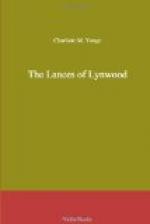While Eustace spoke, Fulk had, by the assistance of two of his retainers, recovered his feet; but though unwounded, he was so dizzied with the blow as to be passive in their hands, and to allow himself to be led into the court, and placed on his horse. Before riding out of the gates, he turned round, and clenching his fist, glanced malignantly at Eustace, and muttered, “You shall aby it.”
Another shout of “Down with the false Clarenham! Hurrah for the Lances of Lynwood, and the brave young Knight!” was raised in the court by the peasantry, among whom Fulk was so much hated, that not even regard for their future welfare could prevent them from indulging in this triumph. Probably, too, they expected the satisfaction of drinking the health of the victor, for there were many disappointed countenances when he spoke from the steps of the porch:—“Thanks for your good-will, my friends. Fare ye well, depart in peace, and remember your young Lord.” Then turning to the parish Priest, he added, in a low voice, “See that they leave the Castle as soon as possible. The gates must be secured as soon as may be.”
He turned back into the hall, and at the door was met by little Arthur, who caught hold of his hand, exclaiming, “So you have won me, and shall keep me forever, Uncle Eustace; but come in, for here is poor old Sir Philip, who was thrown down under the table in the scuffle, bemoaning himself most lamentably.”
“Sir Philip hurt?” said Eustace, who, vexed as he was by Sir Philip’s behaviour, preserved a certain neighbourly hereditary respect for him; “I trust not seriously,” and he advanced towards the arm-chair, where Sir Philip Ashton was sitting, attended by Father Cyril and a man-at-arms, and groaning and complaining of his bruises, while at the same time he ordered the horses to be brought out as speedily as possible.
“Surely,” said Eustace, “you should not be in such haste, Sir Philip. I grieve that you should have met with this mishap. But you had better remain here, and try what rest will do for you.”
“Remain here!” said Sir Philip, almost shuddering. “Nay, nay, my young Sir, I would not have you to remain here, nor any of us, for longer space than the saddling of a horse. Alas! alas! my young friend, I grieve for you. I loved your father well.—Look from the window, Leonard. Are the horses led forth?”
“But why this haste?” asked Sir Eustace. “You are heavily bruised— best let Father Cyril look to your hurts.”
“Thanks, Sir Eustace; but—Ah! my back!—but I would not remain under this roof for more than you could give me. I should but endanger myself without benefiting you. Alas! alas! that I should have fallen upon such a fray! I am sorry for you, my brave youth!”
“I thank you, Sir Philip, but I know not what I have done to deserve your concern.”
“Hot blood! wilful blood!” said Sir Philip, shaking his head. “Are the horses come? Here! your hand, Leonard, help me to rise—Ah! ah! not so fast—Oh! I shall never get over it! There—mind you, I did all to prevent this unhappy business—I am clear of it! Fare you well, Sir Eustace—take an old man’s advice, give up the boy, and leave the country before worse comes of it.”




